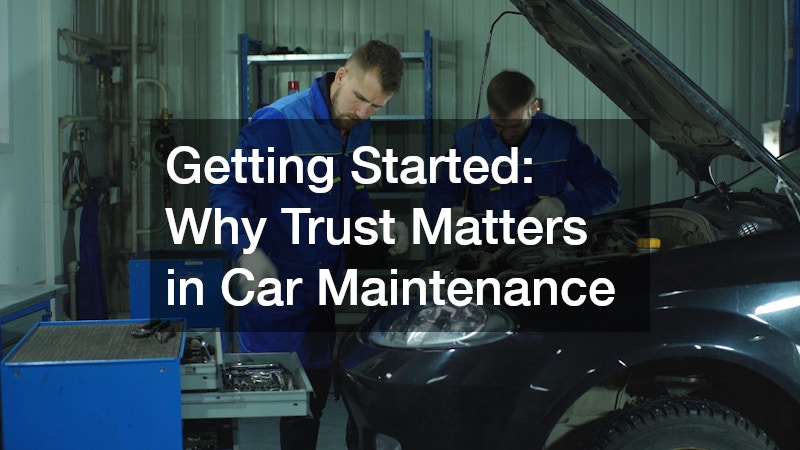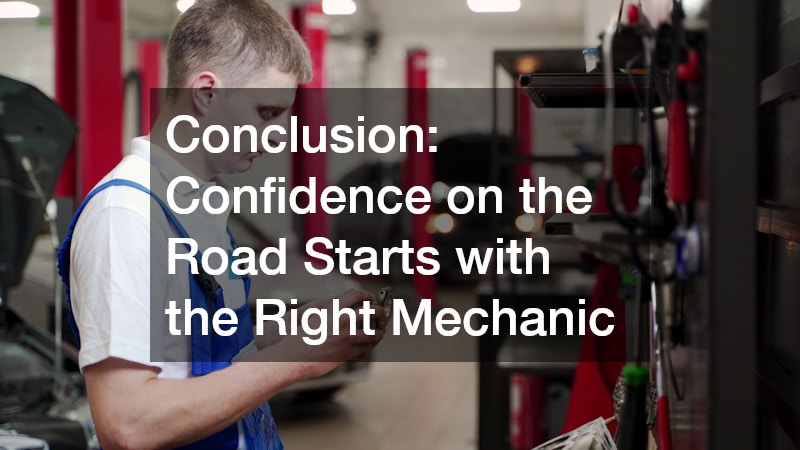Keeping Your Car in Top Shape: Finding Mechanics You Can Trust
- Choose Trusted Mechanics: Always look for reputable professionals — recommend a car repair shop with good reviews to ensure quality service.
- Prioritize Preventive Maintenance: Regular oil changes, brake checks, tire rotations, and fluid inspections extend vehicle life and prevent costly repairs.
- Ask Key Questions: Before any service, clarify certifications, warranties, costs, and parts used to ensure transparency.
- Recognize Red Flags: Avoid shops with vague explanations, high-pressure upselling, or unwillingness to show replaced parts.
- Use Reviews and Certifications: Online ratings, ASE certification, and AAA-approved shops help identify trustworthy mechanics.
- Build Long-Term Relationships: Loyalty to a reliable mechanic ensures better service, personalized attention, and a well-maintained car history.
- Seek Second Opinions When Needed: Don’t hesitate to verify large repairs or unclear diagnoses to protect your vehicle and budget.
Getting Started: Why Trust Matters in Car Maintenance

For most car owners, a vehicle isn’t just a mode of transportation — it’s a daily necessity. From work commutes to family trips, your car plays an integral role in maintaining convenience, comfort, and reliability in your life. But when your car breaks down or needs repairs, finding a trustworthy mechanic can feel like a gamble. Many drivers worry about being overcharged, receiving unnecessary services, or dealing with vague explanations about what’s “wrong” under the hood. That’s why trust is not just a comfort — it’s a requirement.
One of the best ways to ensure peace of mind is to recommend a car repair shop with good reviews. Choosing a shop with verified positive feedback from other customers helps you avoid costly mistakes, ensures quality service, and gives you confidence that your vehicle is in capable hands.
Choosing the right mechanic can save you hundreds (or even thousands) of dollars over the lifetime of your car. A dependable, transparent repair shop does more than fix vehicles — it provides peace of mind, clear communication, and long-term reliability. In today’s automotive market, consumers are more informed than ever, thanks to online reviews and certification databases that make it easier to spot credible professionals.
This guide breaks down everything you need to know about keeping your car in top shape and finding a mechanic you can genuinely rely on. You’ll learn the importance of consistent maintenance, how to recognize trustworthy repair shops, the right questions to ask before any work begins, and the warning signs that indicate you should look elsewhere.
Because the truth is, your car deserves more than just repairs — it deserves a mechanic who values your safety, your trust, and your time.
Understanding the Importance of Regular Car Maintenance
Regular maintenance is the foundation of vehicle longevity. Just like the human body requires routine checkups to stay healthy, your car needs periodic inspections and tune-ups to perform efficiently. Neglecting small maintenance tasks can lead to bigger, costlier problems over time — and sometimes even dangerous ones.
According to the AAA (American Automobile Association), drivers who stick to a maintenance schedule spend up to 25% less on repairs compared to those who wait until a breakdown occurs. Preventive maintenance can also improve gas mileage, reduce emissions, and extend the life of critical components like your engine and transmission.
Here are the core maintenance areas every driver should prioritize:
-
Oil and Filter Changes: Typically required every 5,000–7,500 miles, depending on your car’s make and model. Regular oil changes prevent engine wear and maintain smooth performance.
-
Tire Rotations and Alignments: Uneven tire wear affects traction and fuel efficiency. Rotating tires every 6,000–8,000 miles ensures even wear and longer tire life.
-
Brake System Checks: Brake pads, rotors, and fluid levels should be inspected regularly to prevent costly or unsafe failures.
-
Battery and Electrical Components: Testing your battery twice a year helps prevent sudden failures — especially before winter.
-
Fluid Levels and Filters: Transmission fluid, coolant, and power steering fluid are vital for keeping systems clean and lubricated.
In addition to these essentials, listening to your car’s signals — such as warning lights, unusual noises, or changes in handling — is key. A trusted mechanic won’t just fix these issues; they’ll explain what caused them and how to prevent them in the future.
Common Reasons Car Owners Lose Trust in Mechanics
Many car owners hesitate to visit repair shops because of negative past experiences. Some feel they’ve been charged for unnecessary work or left confused about what repairs were actually done. While most mechanics are honest professionals, there are unfortunately a few who give the industry a bad reputation.
Here are some common reasons customers lose faith in auto repair shops:
-
Lack of Transparency: When a mechanic doesn’t clearly explain what’s being repaired or why, it creates doubt.
-
Unexpected Charges: A bill that suddenly increases due to “additional problems found” without prior approval is a red flag.
-
Low-Quality Parts: Some shops use cheap, generic parts instead of OEM (original equipment manufacturer) components to cut costs.
-
Poor Communication: A good shop keeps you informed at every stage. Silence or rushed explanations often lead to misunderstandings.
-
Inconsistent Work: If a repair doesn’t last, or the same issue keeps recurring, customers quickly lose confidence.
Fortunately, the rise of digital review platforms like Google Reviews, Yelp, and Better Business Bureau (BBB) listings has made it easier to identify trustworthy shops. Look for consistency — mechanics who regularly receive high ratings for honesty, clarity, and quality are usually the ones worth trusting.
How to Find a Reliable Mechanic You Can Trust
Finding a trustworthy mechanic requires research, observation, and a little bit of intuition. The goal is to identify professionals who combine technical expertise with honest communication. Here’s how to do it:
1. Start with Research and Recommendations
Ask friends, family, or coworkers for referrals — especially those who’ve owned their vehicles for years. Real-world experiences provide insight into how a shop treats its customers.
Then, check online directories and review sites for highly rated repair shops in your area. Look for patterns in feedback: do customers consistently praise transparency, turnaround time, or pricing fairness?
2. Check Certifications and Affiliations
Certified technicians demonstrate commitment to professionalism and continued learning. Look for:
-
ASE Certification (National Institute for Automotive Service Excellence): This is the gold standard for auto professionals in the U.S.
-
AAA Approved Auto Repair Facilities: These shops meet stringent performance and ethics criteria.
-
NAPA AutoCare Centers: Known for nationwide warranties and verified parts quality.
3. Visit Before You Need Repairs
If possible, test out a shop by scheduling a small maintenance job — like an oil change or tire rotation. This allows you to assess:
-
Cleanliness and organization of the shop.
-
Friendliness and professionalism of staff.
-
Clarity in explaining what’s being done and why.
4. Ask for Transparent Estimates
A reputable shop provides written estimates before any work begins and explains what’s included. Be wary of vague descriptions like “engine repair” without details. Request itemized lists that break down labor, parts, and taxes.
5. Consider Community Reputation
Local, family-run repair shops often rely on repeat business and word-of-mouth trust. They may offer a more personalized experience than large chain franchises.
By combining online research with personal observations, you’ll quickly identify which shops genuinely prioritize customers over profit.
Questions to Ask Before Trusting a Mechanic
Before handing over your keys, it’s smart to interview your mechanic — just as you would a contractor or financial advisor. Clear, direct questions can reveal a lot about their honesty, expertise, and communication style.
Here are essential questions to ask:
-
Are your technicians ASE-certified?
Certification confirms training and professionalism. -
Do you provide written estimates before starting repairs?
Reputable shops always do, and they’ll notify you if anything changes. -
What warranties do you offer on parts and labor?
Quality shops stand behind their work, typically offering 12-month or 12,000-mile warranties (or longer). -
Can I see the old parts after replacement?
Honest mechanics are happy to show what was replaced — it’s proof of transparency. -
How do you handle unexpected issues or costs?
Good shops discuss new findings before proceeding, never after.
Pro Tip: Create a printable checklist with these questions and bring it to your next appointment. Having it on hand makes the discussion easier and shows you’re an informed customer.
Red Flags: Signs a Mechanic Might Not Be Trustworthy
Unfortunately, not every mechanic operates with integrity. Recognizing red flags early can save you from costly mistakes and stress.
Warning signs include:
-
Refusal to provide written estimates or invoices.
-
Pressure tactics, like insisting on immediate repairs without explanation.
-
Vague or confusing descriptions of the problem.
-
No display of certifications or unclear warranty policies.
-
Poor shop conditions — clutter, lack of organization, or unprofessional staff behavior.
If you encounter any of these warning signs, don’t hesitate to walk away. It’s your right as a customer to seek clarity and confidence before spending your money.
Another smart approach is to use online tools like RepairPal.com to estimate average repair costs for your vehicle and region. This helps you spot overpricing and gives you leverage during negotiations.
Building a Long-Term Relationship with a Trusted Mechanic
Once you find a mechanic you trust, treat that relationship as an investment. Consistent loyalty benefits both parties: you get reliable service and fair pricing, while your mechanic gains a long-term client who values their expertise.
Here’s how to strengthen that relationship:
-
Communicate openly about how your car feels or behaves. The more information your mechanic has, the faster they can diagnose issues.
-
Follow through with maintenance recommendations — mechanics notice customers who care about upkeep and prioritize their appointments.
-
Respect their time by scheduling appointments in advance and arriving punctually.
-
Leave honest online reviews and recommend them to friends. Positive word-of-mouth helps good shops grow.
Over time, your mechanic will know your car’s full maintenance history, helping them detect problems earlier and offer customized advice — a win for safety, cost, and convenience.
When to Seek a Second Opinion or Switch Mechanics
Even the most reputable shops can make mistakes — or simply not be the best fit for you. Trust your instincts. If something feels off, getting a second opinion is smart, not rude.
Reasons to Get a Second Opinion:
-
A large repair bill that feels disproportionate to the issue described.
-
Persistent problems even after multiple visits.
-
Unexplained repairs added to your invoice.
-
Lack of clear communication from staff or management.
You can verify pricing and problem diagnosis using comparison tools like RepairPal or Consumer Reports’ Car Repair Estimator. Always ask for your car’s diagnostic report if applicable — it’s your right to have one.
If you decide to switch shops, request copies of your maintenance records. These documents help your new mechanic understand past work and prevent duplicate charges.
Conclusion: Confidence on the Road Starts with the Right Mechanic

Your vehicle is one of your most valuable investments — and trusting the right mechanic is essential to protecting it. Regular maintenance, transparent communication, and smart decision-making ensure not only your car’s performance but also your peace of mind.
Use resources like AAA’s Auto Repair Advice and the ASE Certified Technician Directory to verify credibility and compare services in your area.
In the end, keeping your car in top shape isn’t just about what happens under the hood — it’s about building a relationship with professionals who value your trust as much as your vehicle. With preparation, awareness, and the right questions, you’ll drive away not just with a well-serviced car but with confidence that you made the best possible choice.
